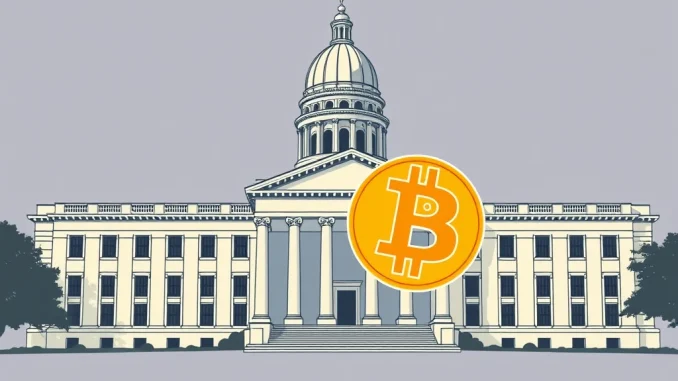
Big news from the Tar Heel State! The concept of states holding digital assets just took a significant step forward. A groundbreaking move sees North Carolina potentially becoming one of the first states to establish a formal Strategic Bitcoin Reserve. This development signals a growing interest among state-level policymakers in exploring cryptocurrencies as part of their asset management strategies.
What is the North Carolina Bitcoin Bill?
According to a report shared by Watcher Guru on X, the North Carolina Senate has given its approval to a bill aimed at creating a Strategic Bitcoin Reserve. While details about the bill’s specifics, such as the proposed amount of Bitcoin to be held or the exact mechanism for acquisition and management, are still emerging, the Senate’s passage is a crucial legislative hurdle cleared.
This particular North Carolina Bitcoin bill represents a legislative effort to diversify state treasury assets. It suggests an official recognition of Bitcoin by state lawmakers, moving beyond just acknowledging its existence to considering its potential role in the state’s financial future. The bill’s journey through the legislative process will be closely watched by crypto enthusiasts and policy analysts alike.
Why a Strategic Bitcoin Reserve?
The idea behind a Strategic Bitcoin Reserve is multifaceted. Proponents often cite reasons such as:
- Inflation Hedge: Bitcoin’s fixed supply is seen by some as a potential hedge against the devaluation of fiat currencies over time.
- Asset Diversification: Adding a non-correlated asset like Bitcoin to a traditional portfolio of stocks, bonds, and fiat currency can potentially reduce overall portfolio risk.
- Attracting Innovation: States that embrace crypto-friendly policies might attract blockchain companies and talent, fostering economic growth in the tech sector.
- Future Value Potential: Believers in Bitcoin’s long-term growth see it as an investment opportunity that could appreciate significantly over time, benefiting the state’s finances.
The passage by the NC Senate Bitcoin bill highlights these potential benefits are being seriously considered at the state level.
What’s Next for the Bitcoin Reserve Bill?
While the North Carolina Senate’s approval is a major step, the Bitcoin reserve bill is not yet law. It still needs to pass the North Carolina House of Representatives and potentially be signed by the Governor. The legislative process involves further debate, potential amendments, and votes in the other chamber.
Here’s a simplified look at the typical process (may vary slightly by state):
- Bill Introduced in Senate
- Senate Committee Review & Vote
- Senate Floor Vote (Passed in this case)
- Bill Sent to House
- House Committee Review & Vote
- House Floor Vote
- Sent to Governor (if passed by both chambers)
- Governor Signs or Vetoes
Each stage presents potential challenges and opportunities for public input and lobbying.
Implications of the NC Bitcoin Law
If the bill becomes the official NC Bitcoin law, it could set a precedent for other states considering similar moves. It would legitimize Bitcoin as a viable asset class for public funds in the eyes of many. It could also spur further legislative action regarding cryptocurrency regulation, taxation, and adoption within the state.
Challenges remain, of course. Volatility is a key characteristic of Bitcoin, and managing a state reserve would require robust security measures, clear custody solutions, and transparent reporting. The public and political debate around using taxpayer funds for volatile assets is also likely to continue.
Conclusion
The North Carolina Senate’s approval of a bill to create a Strategic Bitcoin Reserve is a landmark event in the intersection of state finance and digital assets. While the bill still has legislative hurdles to clear, its passage through the Senate signals a serious consideration of Bitcoin’s role in state-level asset management. This development is a positive sign for crypto adoption and could pave the way for other states to explore similar strategies, potentially shaping the future of public finance in the digital age.



